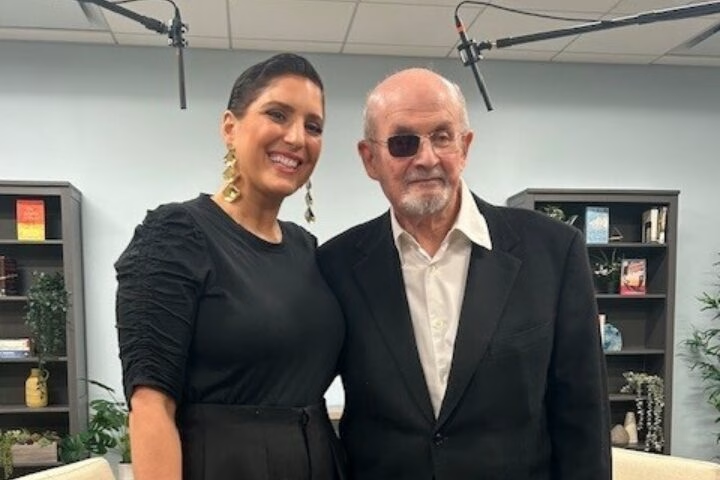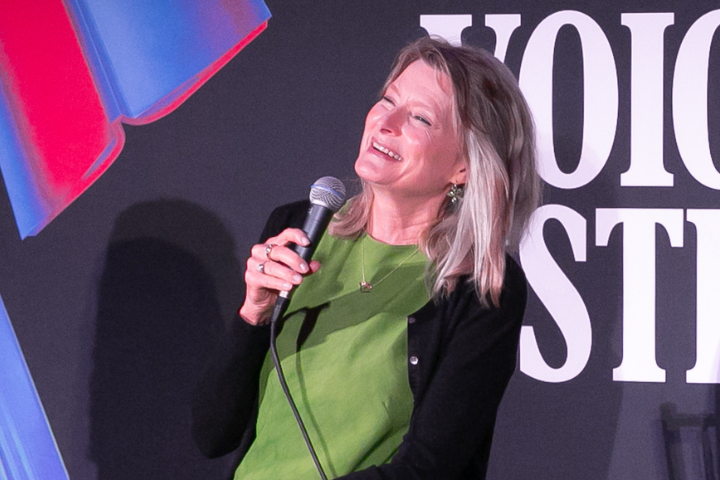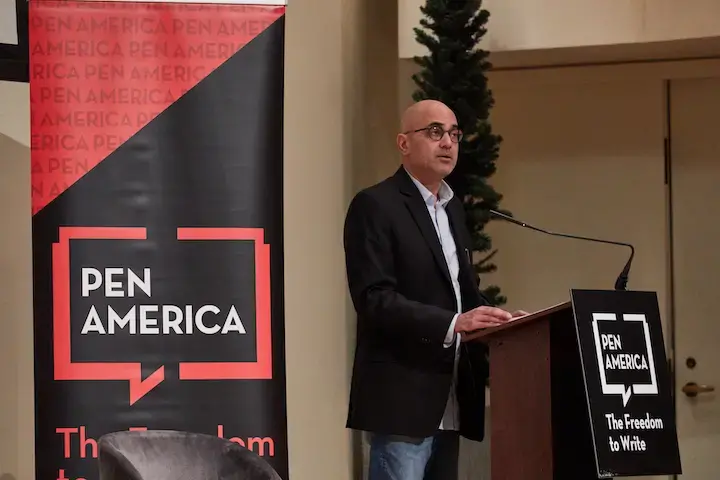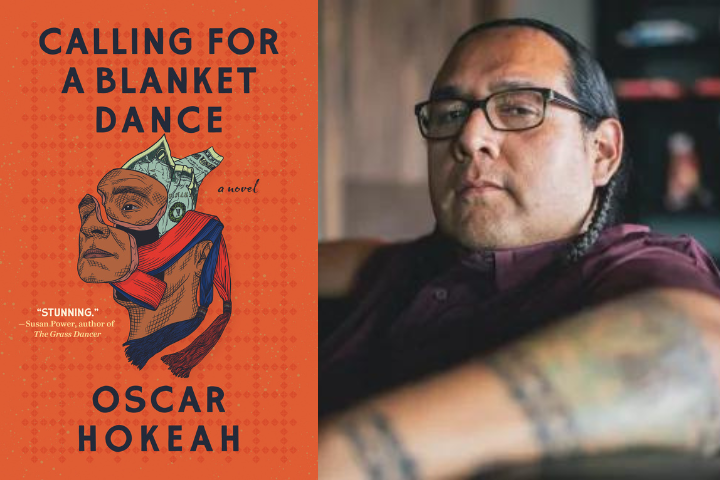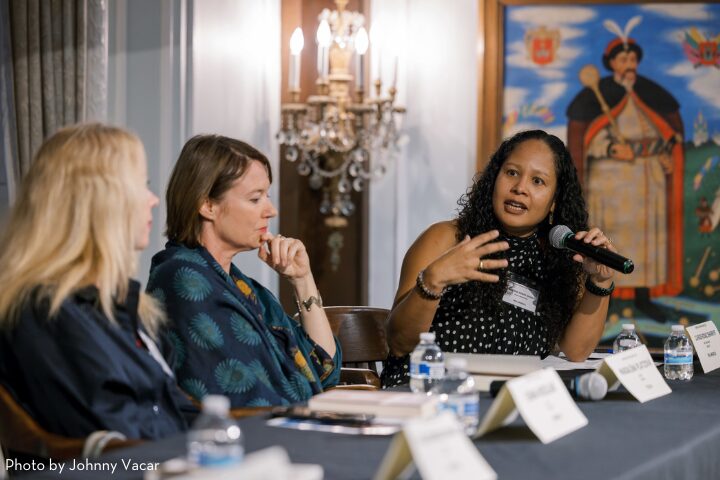
In room 2, Franz Kafka’s reflections and recollections, drafts and dreams come alive. In room 3, a woman from northern Transylvania folds and unfolds into motherhood. In room 1, a 26-year old Polish writer finds himself in occupied France.
It was a Thursday in late October. At The Ukrainian Institute of America in New York City, the big blue and yellow flag fluttered soberly outside as people piled in, checked off their registrations, and grabbed chocolate cookies.
The sixth annual European Literature Night featured authors, translators, and performers from seven European countries sharing insights that resonate across borders. Hosted by the Czech Center New York in collaboration with PEN America, European Union National Institutes for Culture New York (EUNIC), and the Ukrainian Institute of America, along with help from partnering cultural institutions and consulates, the literature night featured two panel discussions and several breakout sessions where audience could meaningfully engage with the works.
“For six years, this has been a celebration of voices and stories that transcend borders and invite us to engage, connect and find common ground through the power of literature,” said Bruce Bybee, program and PR coordinator at the Czech Center.
In the first panel, titled “The Novel as Social Commentary,” Clarisse Rosaz Shariyf, Chief Program Officer, Literary Programming and Interim-CEO at PEN America, asked the writers about identifying with and representing their home countries in writing, and the books they were discussing that evening.
“I write for myself,” said Paulo Rodrigues Ferreira. A Portuguese writer and professor at the University of North Carolina at Chapel Hill, his book No One Goes Back to What They Left Behind (“Ninguém Volta ao que Deixou,” Imprensa Nacional, 2023) traces themes of loneliness, alienation, isolation. “I can see the characters in my novel always wandering around the city, lost. And that was connected to my experience as a student, as a young person in Lisbon. And that sense of life is stuff that makes me Portuguese, like thinking about being resilient and isolated in the world.”
“I write in Czech, so it makes me a Czech writer,” said Magdaléna Platzová. She said not living in Czechia (more widely known in English as the Czech Republic) for most of her adult life has made her realize that it is hard to switch to another language. “When I read books, I switch between French, English, and Czech. But then when I write, it doesn’t really exist in Czech, it comes in French. So I’m trying to stretch the Czech to express something which I know.”
Speaking of his novel, Grande-Fin, as a social commentary, Swiss writer Romain Buffat said, “I’m writing this novel for the working class people, the class where I come from, a class that we don’t see a lot in the Swiss novels.
“We don’t see what tomorrow brings, and we are all kind of lost because we want some certainties, and we don’t have them. We want safety, we want money, we want to pay the bills. We want love. We want everyone to be healthy, and we don’t have those answers, so it’s scary,” said Ferreira, who explained that from a young age, he has seen literature as a way of saving himself. “So the way literature helps you is by finding meanings, without ever finding anyone meaningful.”
“European Literature night was once again a powerful testament to the indispensable work of literary translation. Without the work of literary translators, the evening of panel discussions and readings that represented at least eight languages of origin would never have been possible,” said Rosaz Shariyf, adding, “through literature, the evening connected writers and readers in the audience, across a multiplicity of experiences, geographies and languages – we are grateful to the translators who made this night possible and those who shared their artistry on stage with us.”
In another room, at another panel, titled “Reflections on the Page: Diaries, Autofiction, Memoir,” Sabir Sultan, Director of Literary Programs and World Voices Festival at PEN America, engaged writers and the audience about rediscovering writers through what they have left behind.
“In Lithuania, it has always been very important to defend our language and all those particular dialects from foreign influences,” said Rimantas Kmita, a writer, playwright, and literary scholar, speaking through a translator. “Before it was Russia, and now it is different sort of influences, so the defense of the language has always been central to the people of Lithuania.
Asked about the process of translation when texts, especially diaries and notebooks cross many genres, Ross Benjamin, a German translator whose latest, The Diaries of Franz Kafka, has been received with critical acclaim, said the task was not to make it coherent as that had been done before.
“What I wanted to present was this fertile disarray, this assemblage of disparate genres and textual styles,” he said. “And not necessarily to show development, but a Kafka who was constantly experimenting.”
“We are grateful to have once again partnered with EUNIC-New York to present European Literature Night,” said Sultan. “The incredible evening of talks, readings, and musical performances across a range of languages, provided both a look at contemporary European literature and showed literature’s power to connect us in our collective human experience.”
Post the panel discussions, the audience dispersed into various breakout rooms to engage more intimately with the writers and their texts.
Downstairs, in a room adorned with unique Ukrainian art installations, Grażyna Drabik, a Polish translator, discussed from her book Wartime Notebooks by Andrzej Bobkowski. She read an excerpt of the entry where a young Bobkowski, goes out of his way to the cottage of late New Zealand writer Katherine Mansfield. “It is interesting that she chose her as his specially admired person,” she said. “A person who was writing very much from the female point of view, in this unusual, new kind of way.”
While upstairs, Ioana Nicolaie, a Romanian writer from Transylvania (she quickly confirmed she is not a vampire), talked about her moving book The Book of Reghina (‘Cartea Reghinei’, Humanitas, 2019) and her weekly mentorship of young writers, as well as her marriage to a fellow Romanian author Mircea Cărtărescu.
In an adjacent room, Magdaléna Platzová was heard advising listeners, “Once you go deeper into Kafka, it has nothing to with Kafka,” and dismissing that going to Prague to see Kafka’s legacy is nothing more than a touristy thing to do.
To cap off the night, there was a prosecco, cookies, and an opera based on poems.
“It’s urgent to invent a joyfulness / Multiply kisses and cornfields, / Discover roses and rivers, / And glistening mornings – it’s urgent,” ran the last verse.

